Paideia Conversations, Ep. 16
As we prepare for the opening of registration for Paideia Northwest’s 2022 conference for Christian mamas raising their kids for Christ, I get the pleasure of checking in with the conference speakers one by one… and you get to listen in to find out what they are preparing to share with us in November as we discuss Wonder, Wisdom, & Worship. And as today’s podcast guest suggests, we might throw a little Work into the discussion as well! It all ties together so nicely when Christ is at the center of it… why not?!
For this paideia conversation, we get to hear from Mystie Winckler from SimplyConvivial.com and ScholeSisters.com to find out about her plans for this year’s Paideia Northwest event. She will not only have hard copies of her first book, The Convivial Homeschool, available for purchase but will be expanding on some of the principles and experiences shared therein for her session at Wonder, Wisdom, & Worship. As a seasoned homeschooling mama with two graduates so far, and three more well on their way, Mystie shares with us about her own need for wonder in her pursuit of wisdom as well as the perspective that keeps worship as the central element in their home and life. Don’t neglect the gathering of the saints! From that centrality of worship flows wisdom and wonder to carry into family worship, personal piety, and home education routines. Also, just for fun, find out what drink, hymns, and books Mystie has currently at her fingertips.
I hope this whets your appetite for learning more from Mystie on November 5th! This is just the beginning.
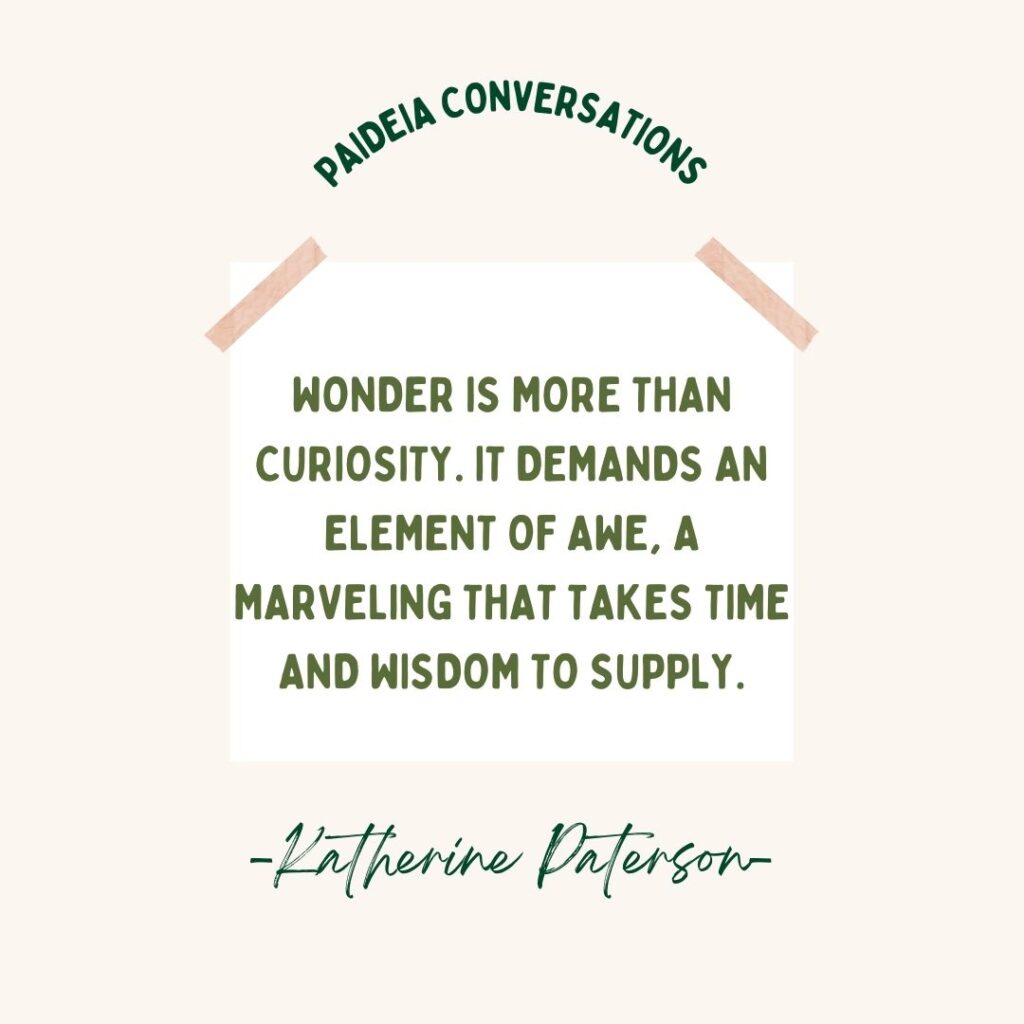
Links and Resources
Gates of Excellence by Katherine Paterson
The Convivial Homeschool by Mystie Winckler
A Gentleman in Moscow by Amor Towles
Transcript
Melissa: Hello and welcome to Paideia Conversations where we dialogue about all things paideia. I am your host, Melissa Cummings, from Paideia Northwest. This is where you can listen in as Christian mamas discuss our purpose to raise our children in the nurture, admonition, instruction, and discipline of the Lord – His paideia.
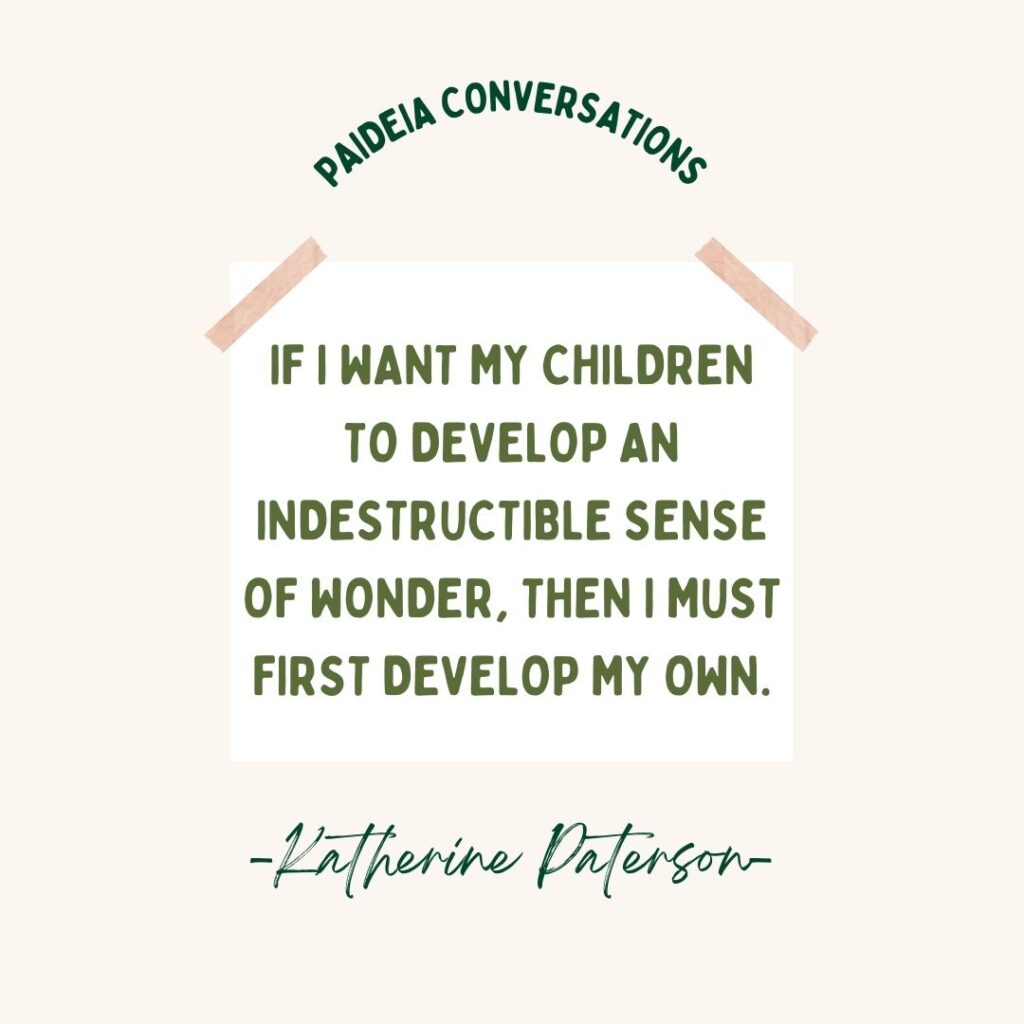
From “Gates of Excellence” by Katherine Paterson. Dog Day Wonder. It was the sort of hot and humid day in late August that I just hoped to get through without snapping off the children’s heads at the neckline. Not the sort, surely, upon which I expected to receive a wonderful gift from one of the very children I was threatening to decapitate.
At about noon, David brought me a cicada which he had earlier discovered coming out of the ground. “I think it’s about ready to shed its skin!” he said. “Watch!”
At about four o’clock, the twig was empty. Our cicada had flown to the oak tree to breed and die, oblivious to the wake of wonder it had left behind. As I let that wonder wash over me, I realized that this was the gift I really wanted to give my children. For what good are straight teeth and trumpet lessons to a person who cannot see the grandeur that the world is charged with?
In her book, “The Sense of Wonder,” Rachel Carson says that if she had influence over the good fairy who gives gifts to children at their christening, she would ask the fairy to give each child a sense of wonder so indestructible that it would last throughout life, was an unfailing antidote against the boredom and disenchantment of later years, a spare occupation with things that are artificial, an alienation from the sources of our strength. Pity we can’t tap that fairy resource. Or is it? Isn’t wonder a truly human characteristic? In fact, I don’t even subscribe to that well-worn platitude that children are born with a sense of wonder that becomes dulled in the pursuit of living.
Children are born with a wholesome sense of curiosity – I won’t argue that. But wonder is more than curiosity. It demands an element of awe, a marveling that takes time and wisdom to supply. Thus to follow Miss Carson’s lead, if I want my children to develop an indestructible sense of wonder, then I must first develop my own. There have been times – that twilight when we saw the double rainbow spanning Lake George, and snatched all the children out of bed to run to the lakeside and watch until it faded into the dusk – or when the riot of summer stars drove us right out of our car into an open field to bend our necks back and gape and gaze. But as I joyfully recall these rare moments, I am sobered to realize how often I must be missing other chances for wonder, which like Dog Day Cicada are all about me humming in the trees.
Tis ye, tis your estranged faces that miss the many splendored thing.
What I desire then for myself and for my children is a face not estranged but expectant. A sense of wonder on the way to becoming both indestructible and contagious.

Joining me today for this paideia conversation is my friend Mystie Winckler. She is the author of The Convivial Homeschool, she is a member of the Scholé Sisters, and she runs something called Simply Convivial which is basically the mecca of homemaking and homeschooling sanity. [laughter] She lives out the gospel in all kinds of ways, and is constantly urging me toward love and good works. I am delighted that she has been on this Paideia Northwest conference journey with me since 2018, and she’s joining us again this year to speak with us about wonder, wisdom, and worship. Thanks for joining me today, Mystie!
All right, would you go ahead and briefly introduce yourself? And tell me what you love about educating your kids for Christ. It’s a, you know, super succinct question. [laughter]
Mystie: well, I am Mystie Winckler, and I write and podcast at SimplyConvivial.com about homemaking and homeschooling and doing life cheerfully. I am also author of the book, The Convivial Homeschool – Gospel Encouragement for Keeping Your Sanity While Living and Learning Alongside Your Kids, which has come out since the last Paideia conference, so I’m excited to actually have a book on the table this year. That’s gonna be fun. And so that book really is my telling of, many of our homeschool stories. And it is especially written for women who have been homeschooling for a while and are finding that maybe homeschooling isn’t what they thought it was. Homeschooling is hard a lot of the time, and so it can become discouraging when we feel like we’re failing or we’re just not succeeding because our every day doesn’t match our imagination. It definitely doesn’t match our plan, and what do we do with that reality? One thing is to know that you’re not alone, and so a part of the reason why I wrote the book is just to say, this is totally normal! But it’s not just normal, like we can all commiserate about how terrible it is – it’s actually a part of God’s sanctifying work in our lives. We homeschool for our children, but God also uses our role as a homeschooling mom in our own lives to sanctify us and to call us to greater holiness. Not because it’s our holiness or our good job that’s going to do a good work for our kids or in our kids. That’s all God. And it’s all God in our kids and it’s all God in us also. So a lot of what we as moms have to learn as we mother and as we homeschool is that God’s working in our lives as well as our kids’ lives, and it’s about faithfully walking where He has put us and the struggles that He’s given us. Rather than doing, you know, executing an awesome homeschool day where everything… where no one cheats and everyone keeps their pencil all day, and no one kicks another person under the table. [laughter]

Melissa: I was actually just looking for my copy of The Convivial Homeschool, and I can’t find it. And I’m like, that’s so not fair; because I had bought twelve copies of it, and gave away at least ten of them but I thought I still had two. And one of… my personal, marked up copy – now I can’t find anywhere. So okay, all right if I can’t find it by November, it’s a good thing that you reminded me that you’ll have books.
Mystie: [laughter] I will have books. It’s always sad to lose a book that you’ve marked up in though.
Melissa: I know! It’s hard… I don’t think I would’ve lent it out. So it’s probably just buried somewhere. But I’m a little stressed about that. Because I was just looking for that, and it’s not here. We start school in a couple of weeks, and I was hoping to get that little refresher. So, I will if I find it.
Mystie: what do you think? The fun thing is that the audiobook version is gonna be out here in about a week or two also. So that’s gonna be fun.
Melissa: how do we get that one?
Mystie: that’ll be on Audible, on Amazon. And I read it, and then it was edited and you know, the sound quality is great, and it’s gonna be on Audible. So just take an Audible credit, and… I don’t know how much… Amazon and Audible does all the stuff with how much things actually cost.
Melissa: oh that’s cool. I love it when authors read their books. So that will be perfect.
So give me an idea: you are obviously bringing Simply Convivial and The Convial Homeschool, and representing the Scholé Sisters at the conference. But as far as being a speaker, what is it that you plan to bring to that proverbial table?
Mystie: well this year, I’m excited to share the stage with my good friend Pam Barnhill, and I know that Pam really speaks very well to the newer homeschool mom. Either whether that’s younger kids, or just starting with older kids. A lot of what she says, not everything, but it’s really geared for people just starting out or just starting to find their way and figure out their own way of homeschooling. And so I am kind of coming alongside that and speaking more for the moms who have been homeschooling for a while, and are maybe feeling like they are losing the joy or losing the momentum, losing the motivation even because it just doesn’t feel like it’s going anywhere. And this year’s topic with wonder, worship, and work – I love how work tacks on on there because we often don’t associate those with the others. We think about those things as we plan for our kids, and we often neglect to think about them for ourselves as homeschool moms. And it’s not just that we have to model for our kids what we want for them, but if wonder and worship and work are good things that we want for our kids, are they good things that we want for ourself also? Are we willing to be students ourselves? Are we willing to learn and grow ourselves? Because that’s what we are all called to do. So we’re making it possible for our kids to do that in our homeschools, but if we’re neglecting our own sense of wonder and worship and work, then we are missing a huge part of the opportunity and our responsibility. I know we say a lot as moms that we want our kids to be lifelong learners, but that means that… a lifelong learner is someone who’s always learning for their whole life, and do we want that for ourselves? Or do we say, well, I’m just not a math person. I’m just not a XYZ person. That’s exactly what we don’t want our kids to do, and we shouldn’t do that ourselves either. So I’m gonna kind of speak on what that looks like as a mom who is super busy and has a lot on her plate already, and feels like, well, I can’t just say that I want to pursue math or nature or music or whatever because my plate’s full. It’s my kids’ plates that I’m gonna be filling up but my plate’s full. And the reality is that through wonder and worship and work, there’s more room on the plate, and some of the things that feel like they’re taking up a lot of that space don’t take up the space that… they don’t make it impossible to include an interest in the world. It’s compatible with the responsibilities, it goes alongside of it, they don’t, they aren’t mutually exclusive where it’s a… It’s not a fixed pie where are certain, so many bits of us that we can put here and there. There is a sense in which that’s true but when we’re talking about wonder and wisdom, wonder and worship, wonder and work, that just goes alongside of everything that we are doing as people. And moms are people too. [laughter]
Melissa: moms are born persons, I heard someone say. You know, and I know that’s not like a unique little thing that she said. But she said it out of the blue to me the other day, and I was like, yes. Yes, moms are. [laughter] We’re not born moms, but we’re born persons. [laughter] So now you have me second guessing, I have to tell you: because you said wonder, wis… no wait, what did you say? You said wonder, worship, and work? And work isn’t one of them!
Mystie: oh! Okay! [laughter]
Melissa: and now I’m like…
Mystie: I totally made that up!
Melissa: man! Now you replaced wisdom with work, but I mean, that should be interchangeable, right?
Mystie: wisdom is an acting upon knowledge. If you don’t do something, you don’t have wisdom. So maybe that could be work. [laughter]
Melissa: oh but now I’m just like, man, how can I get a fourth W in there? [laughter] I can always count on you for giving me extra alliterative options.
Mystie: that’s right.
Melissa: okay, all right. Now my brain is spinning. So as a mom of older kids, as a mom who has been in the trenches of homeschooling for years – two graduates…
Mystie: mhmm.
Melissa: how does wonder come into play? Because I feel like a lot of people say that wonder should be maximized in sort of the grammar, the grammar phase. Or even, you know, toddlers. They’re just, their eyes see wonder so easily. But how, how does that get some kind of priority or presence in your home as a mom with no toddlers around?
Mystie: I know!
Melissa: what does that look like?
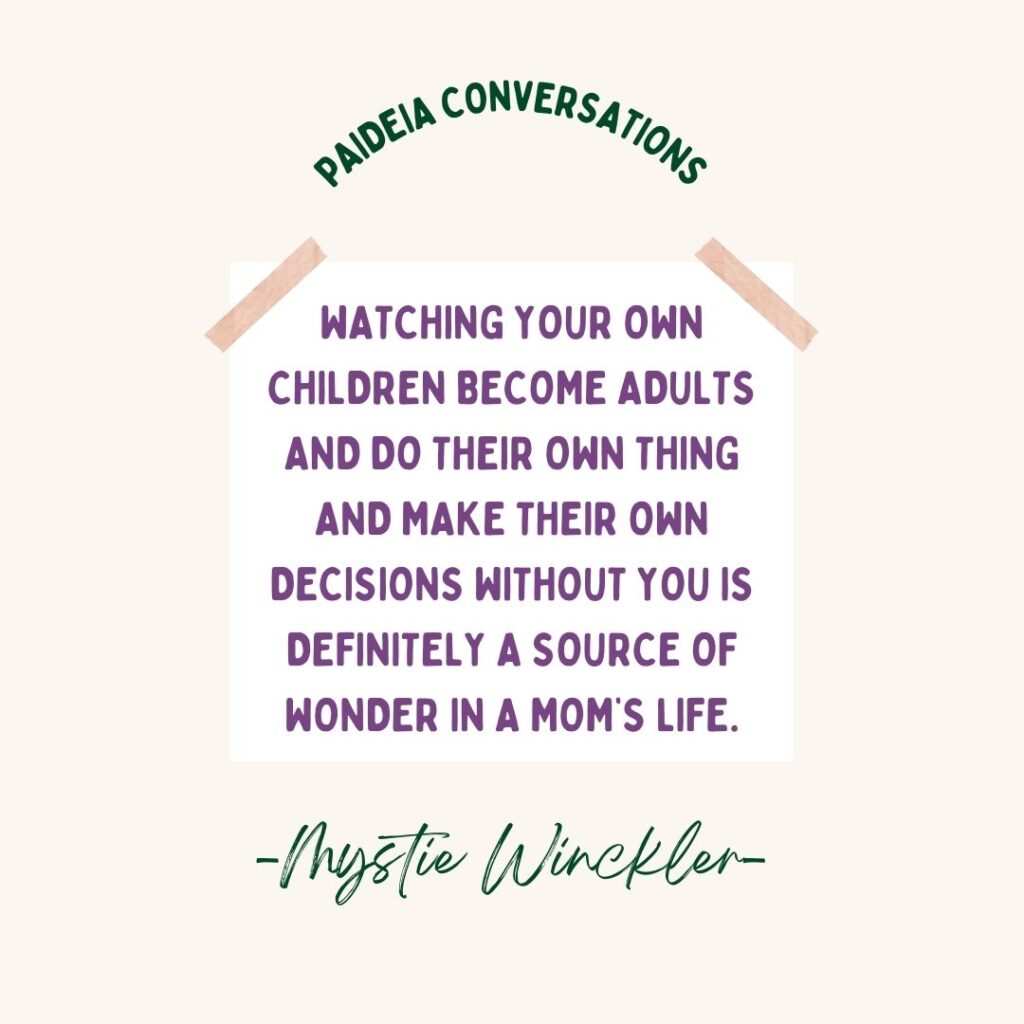
Mystie: well there’s a little bit of the wonder… a different kind of wide eyed wonder… when your teens drive off in a car by themselves. [laughter] It’s maybe a little bit of a different kind of wonder. But it’s a thing. Watching your own children become adults and do their own thing and make their own decisions without you is definitely a source of wonder in a mom’s life. And it can be a big source of stress and worry for moms but when we recognize how God has been working in our lives all along, and in our kids lives all along, and we recognize that this next stage is God’s working in their lives – in our kids’ lives – even without us, and the faith and trust in letting them be their own persons… what would be a source of occasion for stress or anxiety or worry can instead be a source for wonder and worship as we just step out in faith on a new phase of life where you know… hopefully we’ve admitted it earlier in parenting, but you definitely have to by the time they’re adults, but it, the results are not in your hands as the parent. And so when you see that, the earlier you see that the better, and you, because you definitely will have to learn it by the time they’re going out in a car by themselves. And if, if wonder is basic to learning, which it is, then that’s why we begin with it with our little kids, because they need that wonder before learning. And it also comes more naturally to them. So we’re working with the grain when they’re little. But that doesn’t make it something that we grow out of. Even as a newly forty year old, it’s, wonder is still something that I need to intentionally cultivate and I know I went through a lot of years as a young mother, almost intentionally putting it aside. Like thinking that I was past that stage and finding opportunities for my toddlers and preschoolers to experience that, but not wanting even to get it myself because I, you know, I was a grown up now. And so some of that is being, I was a particularly young mother, my oldest, I had my oldest when I was twenty-one. So you know I was a mom in my twenties. And I wanted, I wanted to be a grown up since like I was ten years old. So it’s like, every milestone was, oh I’m finally a grown up! I’m finally a grown up! And a part of my definition at that time of being a grown up was knowing about things, being sure about what you were doing, and not experiencing wonder. That was a little kid thing. It was something to move on from. And so a part of my own journey as a homeschooling mom, as a Christian, was repenting of that attitude and that posture about experiencing wonder.
Melissa: I feel like… and again, since I couldn’t find my copy of your book, I can’t look this up right now… but I feel like you mention that in the beginning of the book – is that idea of repenting of wanting to be past that. Do you remember, is that something in the book? Or did I get that elsewhere from you?
Mystie: yeah, yeah. No, that is in there, and I was gonna expand on that in my talk and share more about that. And more about my, the list that I made when I was twelve about how much of a better mom I was gonna be than my own homeschooling mother. [laughter] She always made sure that I never forgot that! And so now I’m grateful, because now that’s [laughter], I use that story all the time.
Melissa: so tell me briefly. I know your family enough to know that worship is central. It’s central to your day, your routines, your week, your life. It’s not an occasional thing and it’s not an optional thing: it’s central. So tell me how, how does worship lead that centrality in your home?
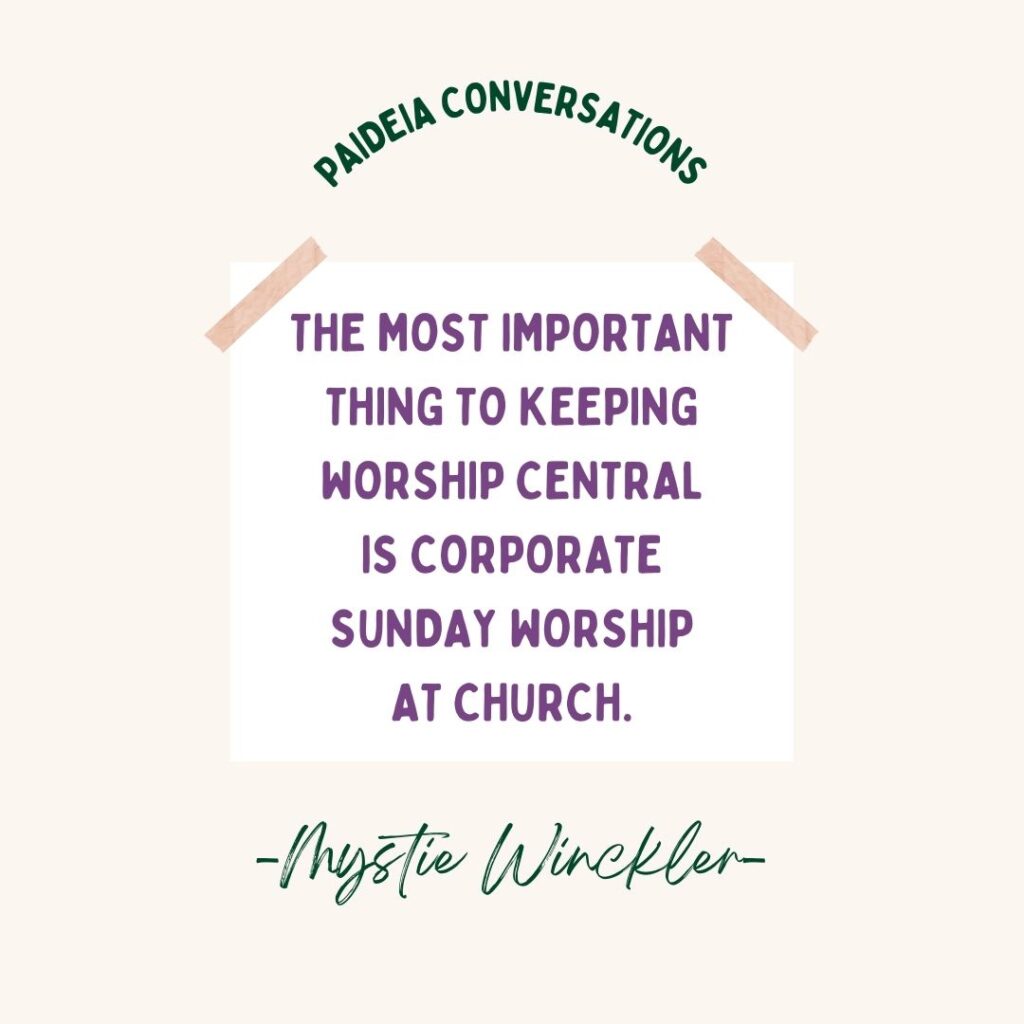
Mystie: I think the most important thing to keeping worship central is corporate Sunday worship at church. We can do family worship and we can do Morning Time with hymns and Scripture and catechism – and we do those things – but those flow from the basic obedience of gathering with God’s people in corporate worship on Sunday. And I think it’s easy to kind of mix those up, cuz on the one hand, one of the things that we do do in our Morning Time, our Morning Basket time, which I know Pam will talk about at the conference, but we, what we choose to do during that time does help prepare us for corporate worship. But that’s because the corporate worship is central. Because you know God says don’t neglect the gathering together of the saints, and there’s a healthy chunk of Scripture that’s about, this is how church is run, this is what church is – and so the things that we do as a family for worship are pointing us that direction and then the Sunday worship is kind of feeding and being fleshed out the rest of the week too. But it’s a, a mutually reinforcing cycle.
Melissa: by those things, I think that’s where that sort of cyclical… man, a cyclical cycle, what am I saying? [laughter] Here’s Redundancy 101! But how wisdom and worship and wonder and let’s throw work in there [laughter] all… they feed each other, they inform one another. When Christ is at the center, those are just, they’re all intertwining.
Mystie: mhmm.
Melissa: I love that. So just for fun, I want to know… so it’s August, it’s hot, it’s summer… what’s your current favorite drink of choice?
Mystie: I’ve got a LaCroix right here with me. [laughter]
Melissa: so do I! [laughter] But yours is pink, mine’s green. What is a hymn that you love? Either that you have always loved or that you’re currently loving?
Mystie: one of our family, foundational hymns is For All the Saints.
Melissa: all the verses, right?
Mystie: all the verses! There are eight verses… eight or nine… there’s at least eight verses to For All the Saints. And we sang that at our wedding twenty-one years ago, and then it’s just been one of those that when we do family singing time… it’s just one of our family favorite hymns, which is fun. I’m, I am looking forward to perhaps in a few… you know, looking forward and it still is definitely forward to someday maybe one of my kids will pick that in their wedding too. You know, being closer, closer to those times than our own wedding.
Melissa: that would be fun.
Mystie: and then also A Mighty Fortress is Our God is my fam… like my parents and my siblings, that was our family hymn, it was my dad’s favorite, and when we would do… it was kind of like our Morning Time, our family worship time, or whatever. People would get to choose hymns, and that one was almost always chosen. So that’s one that, you know, myself, my kids, my nieces and nephews and siblings – all learn to sing, it’s one of the first ones we learn to sing by heart.
Melissa: that reminds me, last week we didn’t have enough hymnals in our row, and so I ended up not having a hymnal. But it was fantastic, because the songs that were chosen that morning, I knew every single one from memory, all the verses.
Mystie: yes!
Melissa: and I just thought, what a gift that I have those decades of this practice of worship, corporate worship but also you know at home worship, feeding my memory. And it just gave me such a practical example of thankfulness for that. I wasn’t Corrie ten Boom, you know, stuck in a prison cell or something. It was corporate worship, I could have walked to another pew and grabbed another hymnal, but I just thought, what a gift that we have been given this capacity for memory! And music. I don’t know, yeah.
Mystie: I think that’s another example of how our homeschooling does benefit us as moms, too. And it’s easy to fixate on our kids memorizing those hymns and our kids repeating and learning and putting things in their heart, and one thing that I realize now more than I did… I didn’t appreciate it when we began, but now those things that we have repeated… and I’ve repeated them with older kids and then the middle kids and now it’s like, no, we’ve got to keep repeating these for the younger kids. And it’s like, well, I know these things. If they don’t know them, you know what, I don’t even care. Because I do, and I like it! So we’re gonna keep doing this because I’m enjoying it, I want to know it. I know it now well enough that I want to repeat it. And they can get to that point in their lives when they’re homeschooling their kids.

Melissa: right? Yes. I think that’s another version of the sanctifying nature of motherhood, or of homeschooling. People will say… I’ve said this too… motherhood is so sanctifying, you know, as a, well the flames are hot, there’s a lot of dross burned off. But then just also that sanctification, that making more holy over time, of things like singing those hymns and doing those catechisms. So. My last question, which I feel like is always a dangerous question with you [laughter], what have you been reading lately?
Mystie: well, I am reading Augustine’s Confessions for the very first time. With a new local book club that I’m in here in our new, new town. And so, I’m not very far. I think I’m on book three, and I have a week and a half left to finish it, so. But I’m reading Augustine’s Confessions. And I just finished A Gentleman in Moscow as my novel, fun read. It’s not Russian literature, which I thought it was going into it. I know I was like a few chapters into a Gentleman in Moscow, and I was like, this doesn’t seem Russian. [laughter] And I quick looked it up, and it’s not, it was written by an American. It was a fun read. I think that it is problematic in its worldview. It was written in 2016, and so it’s a little bit of… it’s nonChristian. It was a fun story though.
Melissa: we need those every now and then. All right, well, thanks for taking the time to help me get excited about Paideia Northwest. I’m… I was realizing it’s… if registration is opening so soon, and I thought, oh, I need to pull out my checklist and start making sure I’m doing all the things I’m supposed to be doing.
Mystie: yes!
Melissa: so checking in with speakers, and then drumming up some excitement at least within myself if not with others is high priority for August. So thanks for taking the time to chat with me about it.
Mystie: yes, thank you, Melissa! And I look forward to seeing you next!
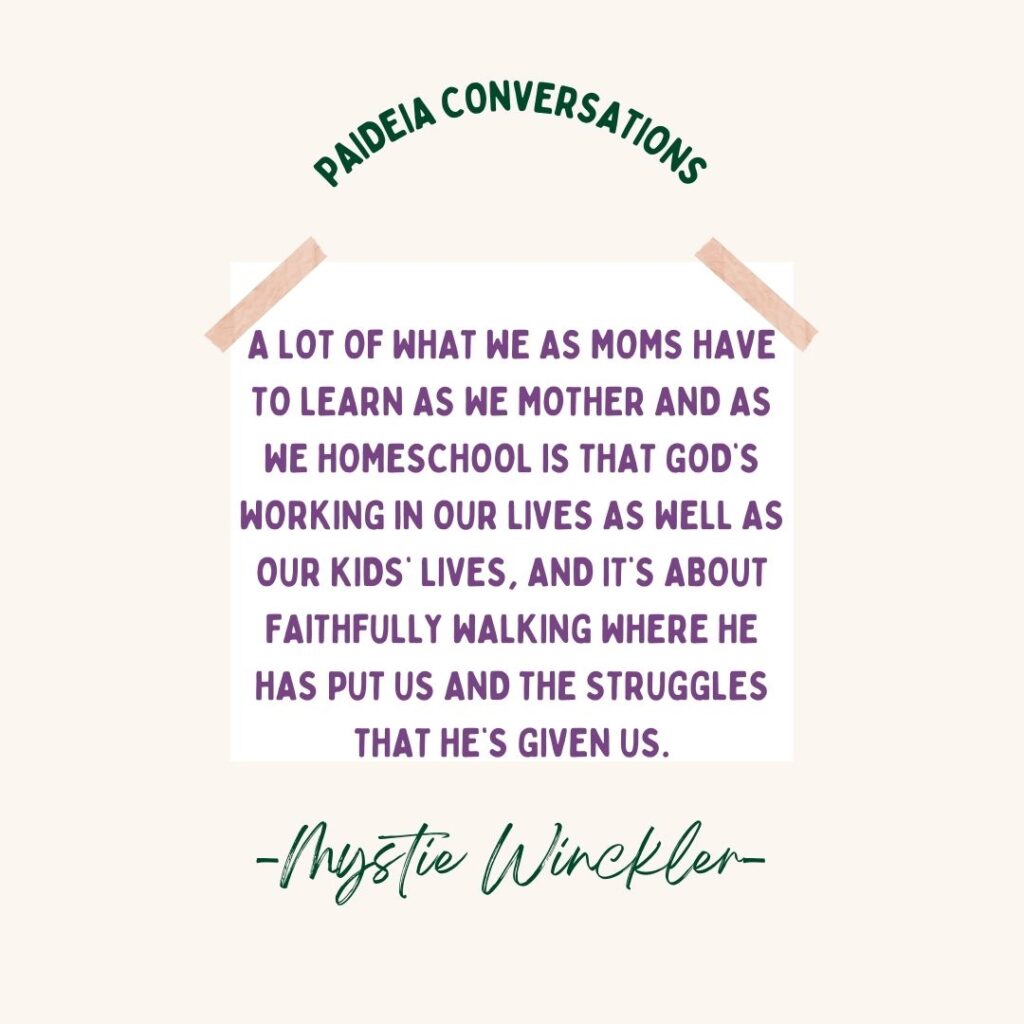
For All the Saints. Text by William Walsham How, 1864.
For all the saints who from their labors rest,
who thee by faith before the world confessed,
Thy name, O Jesus, be forever blest.
Alleluia! Alleluia!
Thou wast their rock, their fortress, and their might;
Thou, Lord, their captain in the well-fought fight;
Thou, in the darkness dread, their one true light.
Alleluia! Alleluia!
Oh, may Thy soldiers, faithful, true, and bold
fight as the saints who nobly fought of old
and win with them the victor’s crown of gold.
Alleluia! Alleluia!
Oh, blest communion, fellowship divine!
We feebly struggle, they in glory shine;
yet all are one in Thee, for all are Thine.
Alleluia! Alleluia!
And when the fight is fierce, the warfare long,
steals on the ear the distant triumph song,
and hearts are brave again and arms are strong.
Alleluia! Alleluia!
The golden evening brightens in the west;
soon, soon to faithful warriors comes their rest;
sweet is the calm of paradise the blest.
Alleluia! Alleluia!
But, lo! there breaks a yet more glorious day;
the saints triumphant rise in bright array;
the King of glory passes on His way.
Alleluia! Alleluia!
From earth’s wide bounds, from ocean’s farthest coast,
through gates of pearl streams in the countless host,
singing to Father, Son, and Holy Ghost,
Alleluia! Alleluia!A Mighty Fortress is our God. Text by Martin Luther, 1529. Translated by Frederick H. Hedge, 1853.
A mighty fortress is our God, a bulwark never failing;
our helper He, amid the flood of mortal ills prevailing.
For still our ancient foe doth seek to work us woe;
his craft and power are great, and armed with cruel hate,
on earth is not his equal.
Did we in our own strength confide, our striving would be losing,
were not the right Man on our side, the Man of God’s own choosing.
You ask who that may be? Christ Jesus, it is He;
Lord Sabaoth His name, from age to age the same;
and He must win the battle.
And though this world, with devils filled, should threaten to undo us,
we will not fear, for God hath willed His truth to triumph through us.
The prince of darkness grim, we tremble not for him;
his rage we can endure, for lo! his doom is sure;
one little word shall fell him.
That Word above all earthly powers no thanks to them abideth;
the Spirit and the gifts are ours through Him who with us sideth.
Let goods and kindred go, this mortal life also;
the body they may kill: God’s truth abideth still;
His kingdom is forever!
Melissa: and that brings today’s conversation to a close. You can find more encouragement and conversations on paideia at PaideiaNorthwest.com and PaideiaSoutheast.com for encouragement and ideas about raising your children in the nurture, admonition, instruction, and discipline of the Lord. Please join me next time for another paideia conversation. And in the meantime, peace be with you.
